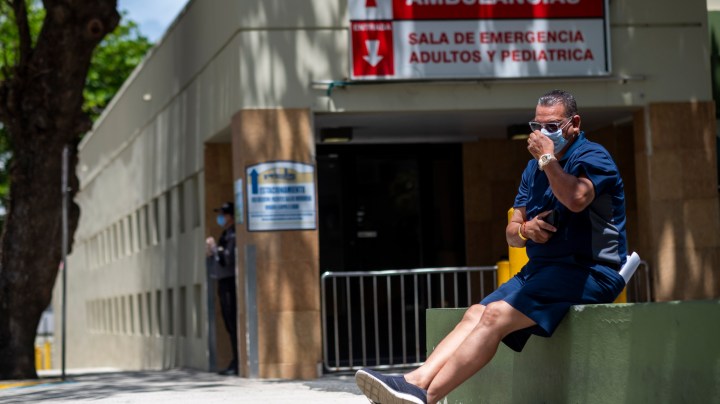Puerto Rico Could Lose Medicare Funding By September

A man wearing a surgical mask sits in front of the emergency room entrance of the Ashford Presbyterian Community Hospital where the first coronavirus patient on the island died earlier in the day in San Juan, Puerto Rico on March 21, 2020. - Almost one billion people were confined to their homes worldwide as the global coronavirus death toll topped 12,000 and US states rolled out stay-at-home measures already imposed across swathes of Europe. More than a third of Americans were adjusting to life in various phases of virtual lockdown -- including in the US's three biggest cities of New York, Los Angeles and Chicago -- with more states expected to ramp up restrictions. (Photo by Ricardo ARDUENGO / AFP) (Photo by RICARDO ARDUENGO/AFP via Getty Images)
Hundreds of thousands of Puerto Ricans could lose their health care as early as September — a reality that Puerto Rican Health Secretary Carlos Mellado is trying to avoid. Mellado was in Washington, D.C. last month to meet with lawmakers in the hopes of getting more aid to the U.S. territory, specifically for Medicare.
The main issue stems from the access Puerto Rico has to Medicaid funding from the United States. Because Puerto Rico’s spending cap is not open-ended — as it is for the country’s 50 states — there is a limit to the money provided to the island.
And, when that money runs out, it is Puerto Rico that is left to pick up the cost. For context, in 2020, the funding from the federal government to the island was capped at $375 million. However, according to the Center on Budget and Policy Priorities, Medicaid expenditures were estimated to reach $2.8 billion. That leaves the island with a nearly $2.4 billion bill to cover in healthcare alone.
Adding to the strain is the economic status of its citizens. The U.S. territory sees double the poverty rate of American’s most impoverished state of Mississippi. The U.S. Census Bureau reports that Mississippi has almost 20% of its people living below the poverty line while Puerto Rico has over 43% of its population under the poverty line. Additionally, the Health Resources and Service Administration reports that 72 of the island’s 78 municipalities are medically underserved while still bearing the brunt of a decades-long exodus of physicians from the island.
Mellado stresses that 46% of the Puerto Rican population uses Medicaid. He states this is one significant reason for advocating for more funding. “It would be ideal if Puerto Rico could have Medicaid funding parity,” he said. “That would be the most permanent solution to this issue.”
Despite his many visits to Congress — including his meeting with Rep. Larry Bucshon of Indiana this week — there is still no word from the Health Secretary on additional funds for Puerto Rico.